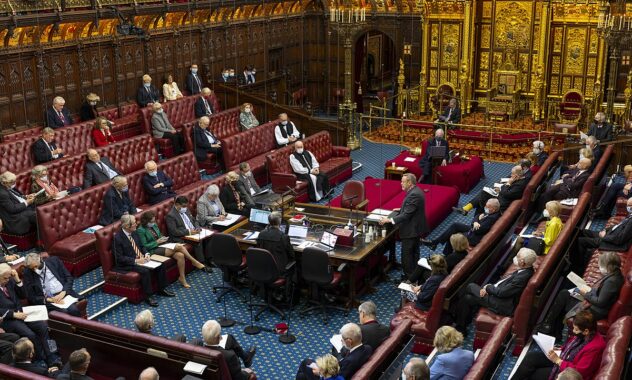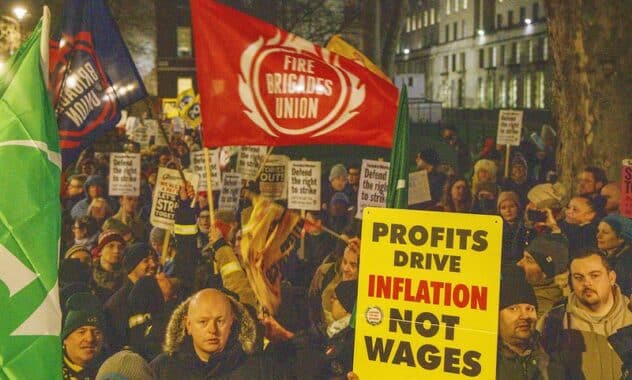Anti-strike law: Minimum service levels for fire and rescue services in England
February FBU circular from Matt Wrack, general secretary

Dear Brother/Sister,
Anti-strike law:
Minimum service levels for fire and rescue services in England
On 8 February 2024, the Westminster government published its minimum service levels for fire and rescue services in England. These new regulations are an attack on the ability of firefighters and emergency control staff to take lawful strike action, even if members have met all the previous strict rules and regulations.
The proposed regulations seek to make strikes ineffective in our industry. They are the worst attack on our ability to take industrial action since the foundation of the FBU more than a century ago. They were introduced at the height of last year’s strike wave. Even though the FBU settled our national pay dispute without recourse to strike action, our strike ballot was instrumental in securing the settlement which was overwhelmingly backed by FBU members.
Ministers intend to tie the hands of the FBU to hold ballots and take effective strike action to defend and improve our pay and conditions. They seek to take away the basic democratic right of workers to organise collectively and where necessary, take industrial action to protect ourselves.
Minimum service levels
On 20 July 2023, the Westminster government’s Strikes (Minimum Service Levels) Act 2023 received royal assent. This gave ministers the powers to designate those services covered by these new anti-union laws.
On 8 February, Westminster fire minister Chris Philp gave a written statement in the House of Commons outlining the changes, which apply only in England. The Home Office has published a range of documents:
https://www.gov.uk/government/consultations/minimum-service-levels-for-fire-and-rescue-services
The regulations set out a minimum service level so that if the FBU gives notice of strike action to a fire and rescue authority, then the authority may issue a “work notice” against the union ahead of the strike. The work notice identifies the workers required to work and specifies the work that they are required to carry out during the strike to secure the minimum service level. This includes extinguishing fires, protecting life or property in the event of a fire and rescuing people in the event of a road traffic accident. The regulations cover firefighters, control room staff and those that work in fire safety roles.
What do the regulations set out
The minimum service level regulations provide for the normal functions of a control room to be carried out during industrial action, as if it were a non-strike day. The control services covered include all emergency calls regardless of how such calls are made. All such calls or requests for assistance would have to be answered, assessed and a response mobilised. The regulations give fire and rescue authorities the power to determine how many employees will be required to reach this minimum service level.
The regulations set out the minimum service level for firefighting functions. Firefighting functions include protecting life and property from fires and rescuing people from the risk of death or injury. Fire and rescue authorities will have the power to determine how many employees are needed to crew the required level of appliances and vehicles. The percentage has been set at 73% of appliances in the regulations. The 73% is a proportion of the usual number of appliances and vehicles that are deployable on a non-strike day, not the total number of appliances and vehicles owned by fire and rescue authorities.
The minimum service level for national resilience assets is set so that national resilience assets, together with trained personnel, are capable of being deployed as if the strike were not taking place that day. The regulations also stipulate that only urgent fire prevention and protection issues are dealt with on a strike day.
Failure to comply with these draconian measures exposes individual members to risk of being sacked, while the FBU would also face substantial fines and other penalties.
Scope
The Strikes (Minimum Service Levels: Fire and Rescue Services) Regulations 2024 apply in England only. However ministers threaten that “Further regulations may extend to other devolved authorities in the future”.
It is clear from the Westminster response that letters from the Welsh and Scottish governments rejecting the legislation made a difference. The government response states:
“With regard to the territorial extent of these regulations, we received letters from the devolved administrations making clear that they did not support the application of minimum service levels in Wales and Scotland.”
It is also the case that the legislation itself does not apply in Northern Ireland.
There is no need for any fire and rescue authorities in England to issue work notices. Fire and rescue authorities can commit right away to never issue a work notice. In the recent train drivers’ strikes, no train operating company issued a work notice. When one company began the process, the threat of prolonged strike action made them back down. Fire and rescue authorities do not have to implement these regulations when they reach the statute book.
Who has proposed these restrictions?
The primary responsibility for these new restrictions on trade union freedoms lies with the current Conservative government. As long as this party remains in power at Westminster, these restrictions will remain in place.
However, it is also clear from the Westminster government’s response that some senior figures within the fire and rescue service have helped ministers design the new restrictions. They claim that “the majority of fire and rescue services were in favour of a nationally set minimum service level but with some degree of local flexibility”. The government response states:
“A total of 72 consultation responses were submitted. The majority of English FRSs (38 of 44) submitted some form of response, either a bespoke response or a letter stating that their views aligned with those set out in the response submitted by the National Fire Chiefs Council (NFCC).”
FBU members might want to ask principal managers who mandated the NFCC to collaborate with the introduction of these anti-union laws? The NFCC is an organisation with less than 500 members, and yet has an income of more than £12 million a year, much it from central government. The NFCC is a private limited company, registered with Companies House. It is not a public body; nor is publicly accountable. Although 20 consultation responses raised concerns about the negative impact on industrial relations, ministers and their NFCC advisers have pressed on with the restrictions.
Minister’s double standards
Westminster fire minister Chris Philp issued a press release with the new regulations. He said:
“While it is right that workers have the ability to strike, this must not come at the cost of public safety. The new minimum service level for fire and rescue will help save lives.”
Firefighters will find the Westminster government’s new-found concern with public safety a little ironic. Since 2010, almost 12,000 firefighter jobs have been cut, mostly due to central government funding cuts. This is one-in-five (20%) of the entire workforce. This has led to slower response times, unsafe crewing levels, unauthorised broadening of firefighters’ roles, too few firefighters on scene and other risks to safety.
If ministers were serious about improving public safety, they would commit to sustained investment in the fire and rescue service. Firefighters tackle existing and newly-emerging risks, such as extreme weather. This requires a professional, trained workforce, decently rewarded for the service provided.
Instead ministers prefer to stop workers from defending our jobs and conditions. Instead ministers give unelected and unaccountable chief fire officers more powers to impose their diktat. This is no way to run a public service.
Let us be very clear: the only reason for this new legislation is because the current Westminster government wants to drive down the wages, terms and conditions of workers.
Oppose fire MSLs
The Westminster government has sufficient MPs to push through its draconian laws against firefighters. However, opposition MPs have challenged these regulations. Labour has committed to repealing them if they win a majority at the next general election. But there is much to be done before that.
FBU officials should raise our arguments against these proposals with fire and rescue authority members and with chief fire officers. As the employer, a fire and rescue authority should give the FBU an undertaking that they will never impose a work notice.
FBU officials can also raise the issue with their current MP and every candidate standing in their constituency in the forthcoming general election. MPs should commit to opposing this legislation and to repeal it at the earliest opportunity if it is imposed.
Yours in unity,
Matt Wrack
General Secretary
Download the circular here.







